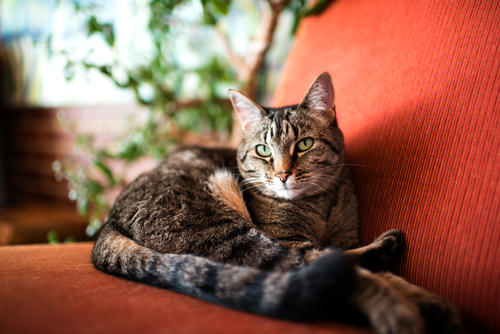
Cats can live well into their 20s, but if your cat is older than 8 years, she is considered a senior cat. Older cats have special needs that should be addressed to keep them in tip top shape. Think about these things if you want to keep your senior cat as healthy as possible.
- Involve your veterinarian. Ask anyone who is an older person and they will tell you that they need doctors more than they did when they were young. Aging takes a toll on body systems and older patients are at higher risk of certain conditions. Your cat does not have to suffer. There are things that your vet can recommend. Vets are not just for vaccines anymore (and never should have been). Your veterinary staff is your army fighting for good health and examination with diagnostic testing are ammunition in the battle.
- Pay attention to appetite and nutrition – Your older cat may have changes in appetite or even ability to eat the way he always has. Pay attention to him while he is eating and be sure that you would be able to tell if he isn’t eating enough (more important in multi-cat households). Provide different food options and textures and make sure that are not bargain basement varieties. Your vet may tell you specific nutritional needs based on the screening tests for your individual cat. Be sure that his food is easily accessible if he does not feel like climbing and remember that his senses could be different, so his tastes may change. Need guidance? Check out our review of top senior cat foods.
- Exercise for mind and body- Cats are wired to hunt and prowl. Your older cat may not want difficult games, but you can still play and interact with her. Puzzle toys are great at stimulating the mind and rewarding thought and exercise. Your cat’s body follows the “use it or lose it” theory just like yours. Use her muscles and use her mind to help her stay sharp and fit. Encourage her to move and think, but don’t push her if she seems disinterested or uncomfortable. Variety is the spice of life, though, so if she is not interested in one game or toy, try to find one that will pique for interest.
- Be Alert – Older pets are more prone to disease that produce vague signs, like increased thirst or changes in appetite or energy level. It is easy to say your cat is “just getting old” and write the changes off, but is that fair to him? Check him every day for lump or bumps. Keep a log or mental note if he is eating his normal amount. Be aware if you are filling the water frequently or changing the litter box more. Cats always try to hide pain and illness so you will have to be a detective some times to notice the subtle cues.
Watch your cat and spend time every day. Touch him and feel his body. Whether or not you notice changes, always include your veterinary team because they are your partners in your cat’s quality of life. If you are not sure, it is best to ask. If your cat hates going to the vet, call ahead and find out if there are things you can do or change to make it less stressful for you and your cat, but don’t ignore the passage of time. We are all going to age. Hopefully someone will love us enough to make sure we are living life to the fullest.

